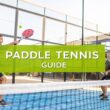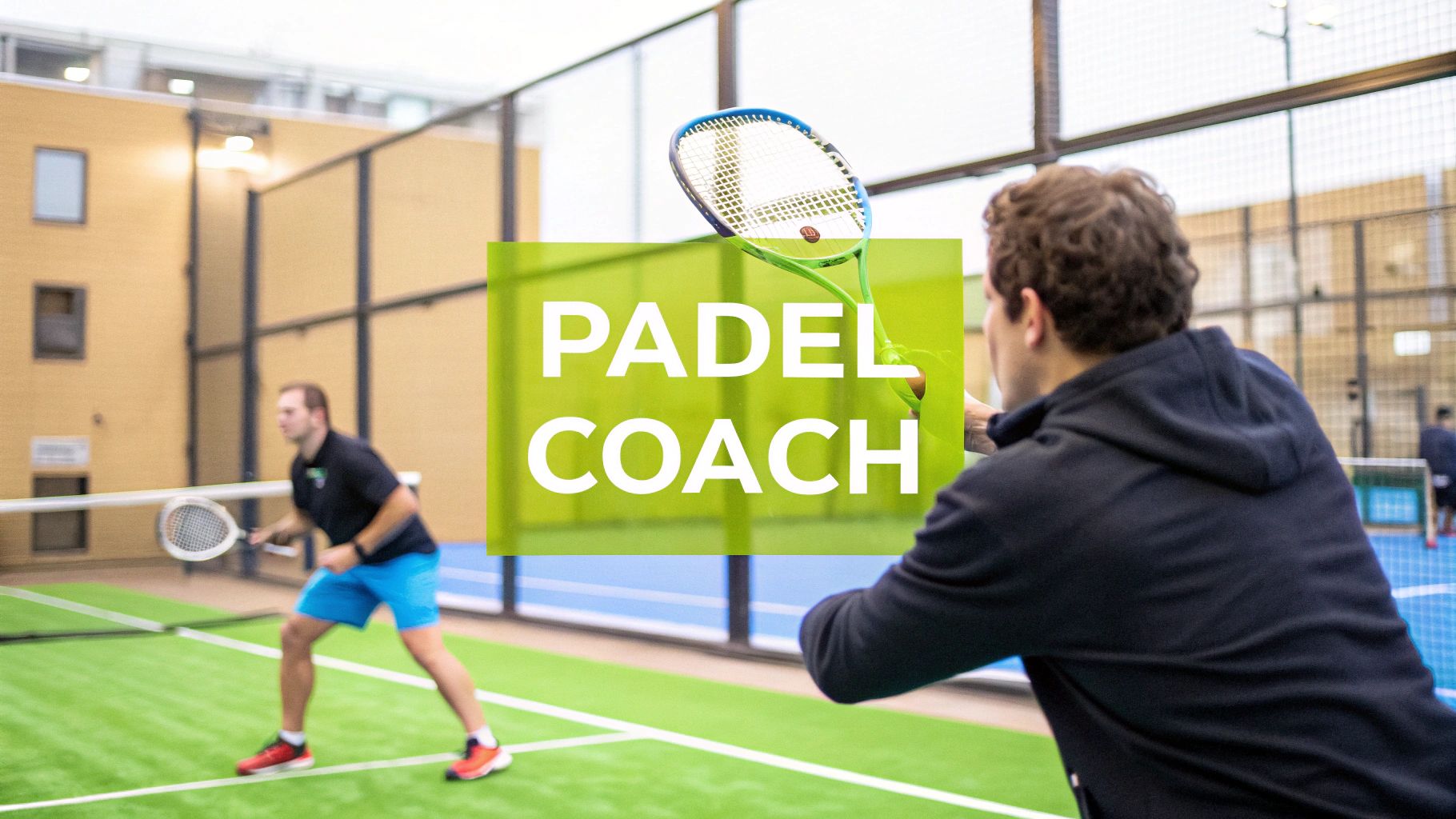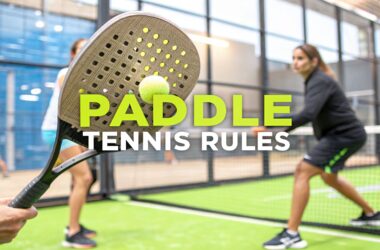So, you want to become a padel coach? Excellent choice. To get there, you'll need a solid mix of playing skill, official qualifications, and genuine hands-on teaching time. Think of it as a three-pronged approach: master the game yourself, get certified with a recognised body like the LTA, and start building your experience by helping out at clubs or coaching beginners.
Why Padel Coaching Is a Huge Opportunity Right Now
If you've been thinking about a career in padel, your timing is absolutely spot on. The UK is in the middle of a full-blown padel explosion, with the sport rocketing from a niche interest into a mainstream obsession.
This boom has created a massive gap in the market. Simply put, there are far more new players flocking to the courts than there are qualified coaches to teach them.
This isn't just a passing trend. It's a real shift, backed by serious investment and new facilities popping up everywhere. The Lawn Tennis Association (LTA) is pouring money into the sport's growth, which means more job security and incredible opportunities for anyone looking to start their coaching journey.

Buy the best padel gear to level up your next game!
CHECK OUT this deal from Padel Market!Get ready to take your game to the next level with the latest padel gear from Padel Market! Fast EU and Worldwide Shipping
Just look at the numbers. According to the LTA, padel participation has skyrocketed from a mere 15,000 players in 2019 to an expected 400,000 by the end of 2024. If you want to dive deeper into these figures, you can check out the details on the LTA's official padel site.
The Numbers Fuelling the Boom
What does this incredible growth actually mean for you on the ground? It means new courts are being built at a frantic pace, and every single one of those courts needs programmes, lessons, and most importantly, coaches.
Clubs are genuinely scrambling to find good instructors to handle the wave of new members who are all desperate to learn how to play. This creates the perfect opening for new talent. Whether you dream of working at a high-end tennis club that's adding padel courts or a brand-new, dedicated padel centre, the jobs are there for the taking.
You’re not just looking for a job in a crowded market. You’re stepping into a movement at its most critical growth phase, where your skills are in high demand from day one.
A big part of padel's magic is how social and easy it is to get started. It has a much gentler learning curve than tennis, which makes it a hit with everyone from young families to retirees. This wide appeal fuels the need for coaches who can connect with different ages and abilities, making it a truly dynamic and rewarding career.
To give you a clearer picture of just how big this opportunity is, let's look at the statistics driving the boom.
UK Padel Growth At A Glance
The table below breaks down the key numbers that show just how fast padel is expanding across the UK. These figures really highlight the scale of the opportunity waiting for new coaches.
| Metric | Statistic |
|---|---|
| UK Player Growth | From 15,000 (2019) to over 400,000 (2024) |
| Total UK Courts | 893 courts across 300 venues |
| LTA Investment | Over £6 million into padel development |
| New Court Funding | £4.5 million for 80 new courts |
As you can see, the investment and growth are substantial. With hundreds of courts already in place and many more on the way, the demand for skilled coaches to fill them has never been higher. This is the perfect moment to get qualified and build a career in one of the UK's fastest-growing sports.
The Core Skills of a Successful Padel Coach
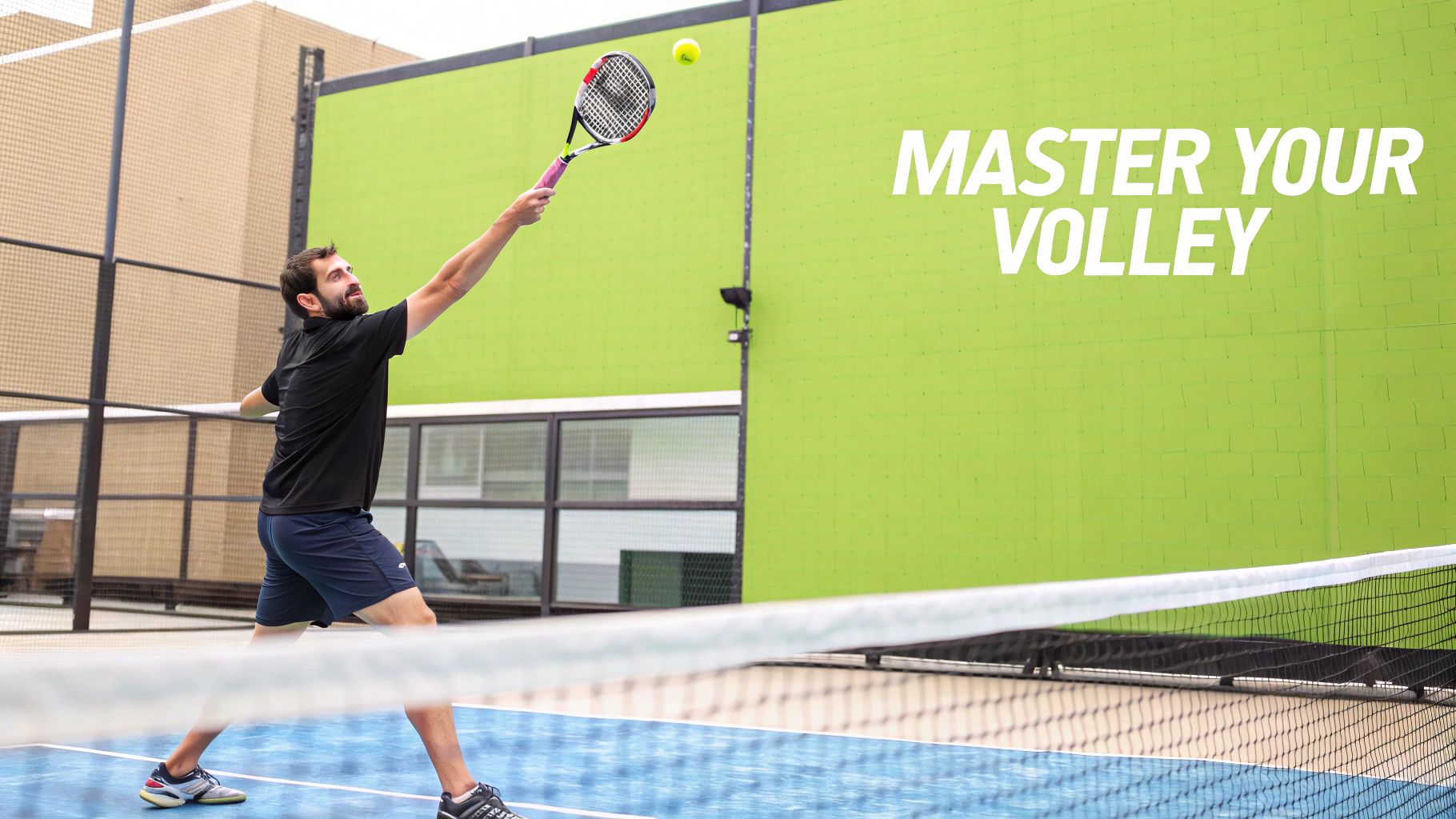
While official qualifications are your ticket into the game, they don't automatically make you a great coach. I've seen plenty of certified coaches who struggle to connect with players. The best ones—the ones who are always in demand—have a special mix of on-court know-how and off-court people skills.
It's not just about being a good player; it's about being an exceptional teacher.
Your journey to becoming a sought-after padel coach begins with mastering the fundamentals. And I don't just mean for yourself. You need to understand the mechanics behind every shot so deeply that you can explain it to anyone, from the basic groundstrokes to the iconic ‘bandeja’ and ‘vibora’.
Being able to hit a perfect bandeja is one thing. Breaking it down into simple, digestible steps for a total beginner who has never held a racket before? That's a completely different skill. And that's the real heart of coaching.
Technical and Tactical Insight
Great coaching is so much more than just shot drills. It's about building tactical intelligence in your players. You need to develop a sharp eye for the strategic side of padel.
This breaks down into a few key areas:
- Court Positioning: Teaching players where to stand, how to move as a pair, and how to read what their opponent is about to do next.
- Shot Selection: This is crucial. Guiding players on when to unleash a powerful smash versus playing a soft, defensive lob, or when to use the back glass to their advantage.
- Pattern Recognition: Helping your students spot what their opponents do over and over again, and then building simple strategies to pick those patterns apart.
To really sharpen your own tactical mind, it never hurts to go back to basics. If you need a refresher on the fundamentals of the game, you might want to explore our guide on how to play padel. This is the bedrock you'll build all your tactical lessons on.
The Essential Off-Court Competencies
What truly separates a good coach from a great one are the skills they use when the ball isn't even in play. These "soft skills" are what build trust, drive real improvement, and keep clients booking you week after week.

Buy the best padel gear to level up your next game!
CHECK OUT this deal from Padel Market!Get ready to take your game to the next level with the latest padel gear from Padel Market! Fast EU and Worldwide Shipping
Picture this: you're coaching a group with different skill levels. One player is flying along, picking everything up instantly, while another is getting visibly frustrated. A great coach knows how to handle this. You've got to encourage the struggling player while giving the advanced one a new challenge—all without making anyone feel left out or slowing down the session.
The art of coaching is being able to switch up your communication style on the fly. You might use simple, direct instructions for a kids' group, but then shift to more detailed, analytical feedback when you're working with competitive adults.
This adaptability is absolutely key. The demand for padel coaches is exploding, and that's largely because the sport is attracting everyone. In the UK, public awareness of padel shot up to 43% in 2024, a huge jump from just 23% the year before. More importantly, the number of regular players doubled to 51,000 in that same time. With millions more keen to try the sport, you'll be teaching an incredible variety of people.
Ultimately, your success comes down to building relationships. Active listening, empathy, and clear, positive communication are your most powerful tools. They turn a simple lesson into a brilliant coaching experience that people remember and recommend.
Your Guide to UK Padel Coaching Qualifications
If you're serious about becoming a padel coach in the UK, getting your official coaching badge isn't just a good idea—it's essential. While a deep love for the game and natural talent are great starting points, a formal qualification from a recognised body like the Lawn Tennis Association (LTA) is the key that unlocks the door. It's the credential that proves to clubs, players, and employers that you've met a professional standard of knowledge and safety.
In the UK, the LTA is the gatekeeper for official coaching qualifications. They’ve laid out a clear pathway that can take you from your very first day on the coaching ladder all the way up to working with elite performance players. For most people taking their first step, the journey starts with the LTA Padel Instructor qualification.
Starting with the LTA Padel Instructor Course
Think of the LTA Padel Instructor qualification as your entry ticket. It's designed for people who are ready to move from playing to teaching. It’s perfect for proficient club players who have a solid handle on the game and want to learn how to break down the fundamentals for others. This course isn't about perfecting your own bandeja; it’s about learning how to teach that shot to a group of absolute beginners.
Before you can enrol, you’ll need to tick a few boxes:
- A good playing standard. You don't have to be a pro, but you must be able to demonstrate all the major shots competently.
- An LTA membership.
- A valid DBS check and a first aid certificate.
The course itself usually spans several days and dives deep into the practical skills you need to run group sessions. You’ll cover everything from how to organise drills and manage a court full of different ability levels to making sure every session is safe, engaging, and genuinely fun. Budget around £400-£500 for the course, which typically covers your training, materials, and final assessment.
Here's an infographic that captures how getting certified marks a pivotal moment in your coaching journey.
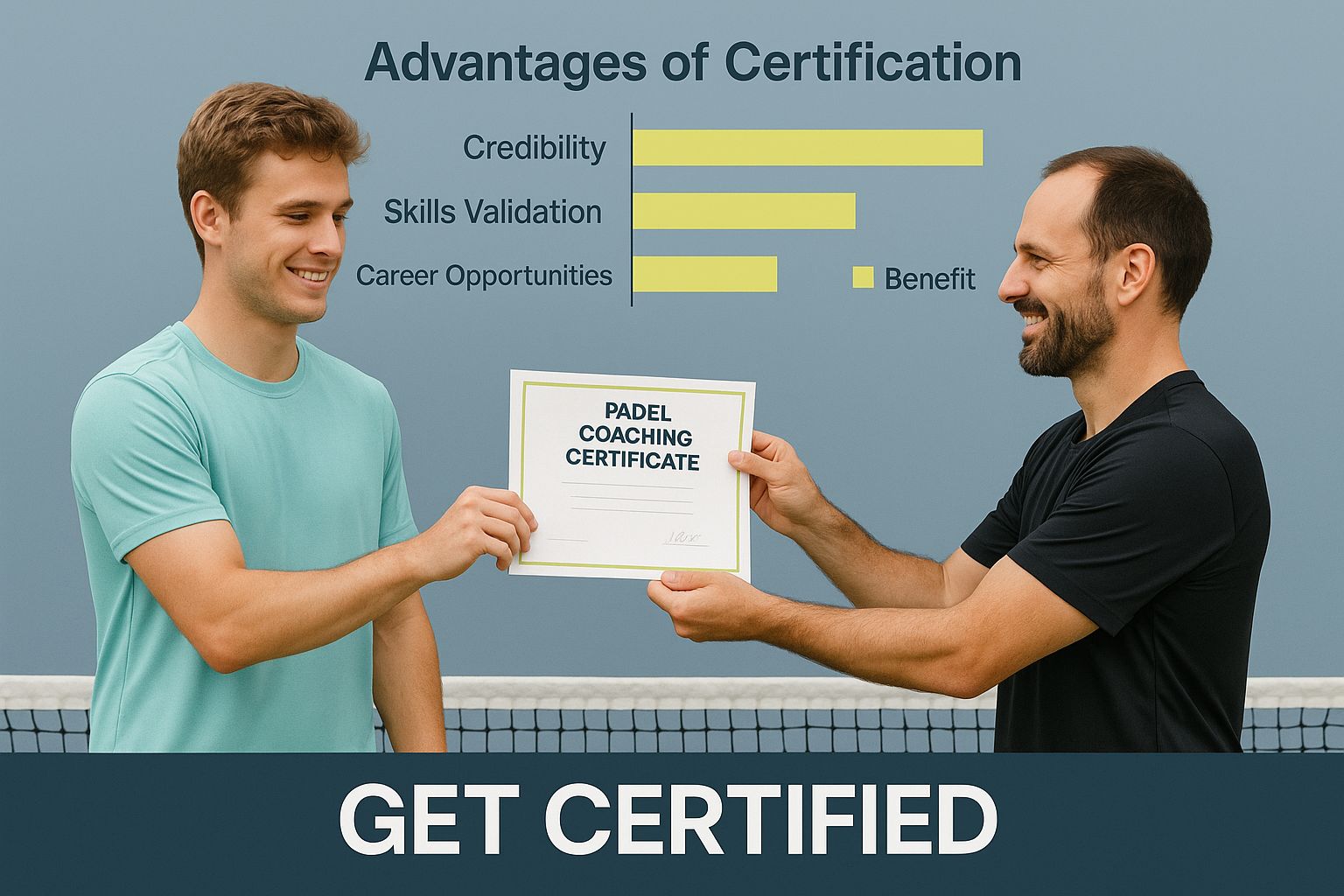
This formal recognition is what opens the door to real, professional coaching roles.
Progressing to Higher Levels
Once you have some real-world experience as an LTA Padel Instructor, you can set your sights on the next rung: the LTA Padel Coach (Level 3). This is a significant jump up. It demands a much deeper understanding of advanced tactics, technique, and how to develop a player over time. This is where you really transition from being an instructor to a true coach.
The Level 3 course gets you ready to work with more competitive players, design long-term training programmes, and give detailed technical and tactical feedback. Tutors are looking for a sophisticated understanding of the game. For example, can you not only teach a player how to hit a vibora, but also explain when and why it’s the right shot choice in a specific match situation?
Passing your assessments is about more than just reciting the textbook. Assessors want to see your personality come through. They’re looking for coaches who are adaptable, can think on their feet, and build a genuine rapport with their players during the practical exams.
To really nail this, you need to bring your A-game. For any ambitious coach, keeping up with the professional circuit is a goldmine for insights into high-level strategy and player performance. A great habit is to follow the latest padel ranking and player news, which helps you understand the game at its peak.
To help you visualise your potential career path, the table below breaks down the main LTA qualifications.
Comparison Of UK Padel Coaching Qualifications (LTA Pathway)
This table gives a clear snapshot of the LTA's coaching pathway, helping you understand what each level involves and the kind of roles it can lead to.
| Qualification Level | Target Audience | Key Skills Taught | Typical Role |
|---|---|---|---|
| LTA Padel Instructor | Aspiring coaches, club players | Group coaching, session organisation, fundamental techniques | Assistant coach, leading beginner and social sessions |
| LTA Padel Coach (Level 3) | Experienced instructors | Advanced tactics, technical analysis, individual player development | Head coach at a club, working with competitive players |
| LTA Padel Senior Coach (Level 4) | Professional coaches | Mentoring other coaches, programme management, elite performance | Director of Padel, managing coaching teams, national level |
Each step on this ladder builds on the last, offering a structured way to grow your skills and career in the exciting world of padel coaching.
Building Your On-Court Experience And Reputation
Earning your LTA Padel Instructor qualification is a huge milestone—but that certificate only tells half the story. The other half is written on the court, stroke by stroke, with every player you guide. Theory tests your knowledge; real-world practice builds your true coaching credibility.
Don’t wait for a perfect paid role to land in your lap. Instead, be the catalyst for your own growth. Every hour spent coaching, observing or trialling new drills brings you one step closer to expertise.
Gain Practical Hands-On Experience
Your nearest padel club is the lab where you’ll refine your methods. Introduce yourself to coaches and members, then volunteer any chance you get. This hands-on approach accomplishes two goals: it fills your coaching diary and cements your presence in the local padel community.
Here’s how to ramp up your court time:
- Volunteer at junior programmes, social mixers or beginner taster sessions
- Shadow a seasoned coach to see how they structure lessons and manage different personalities
- Run free introductory clinics, so you can test drills and gather early feedback
Building Your Reputation And Client List
Once you feel comfortable leading sessions, shift your focus to expanding your network. In padel circles, word-of-mouth holds incredible sway. Chat at club events, lend a hand at tournaments and let your enthusiasm shine through every conversation.
Positive feedback fuels growth. After each session, invite participants to share a short testimonial. Use those quotes—and clips of your coaching—to build credibility online. For instance, exploring making effective training videos can help you highlight your style on social media.
Discover what sets your sessions apart. Do you thrive on high-energy drills, strategic insights or creating a fun, social vibe? That signature flair is what makes players seek you out.
A solid blend of practical experience, genuine testimonials and a clear coaching identity will lay the groundwork for a thriving padel career.
How to Launch Your Padel Coaching Business
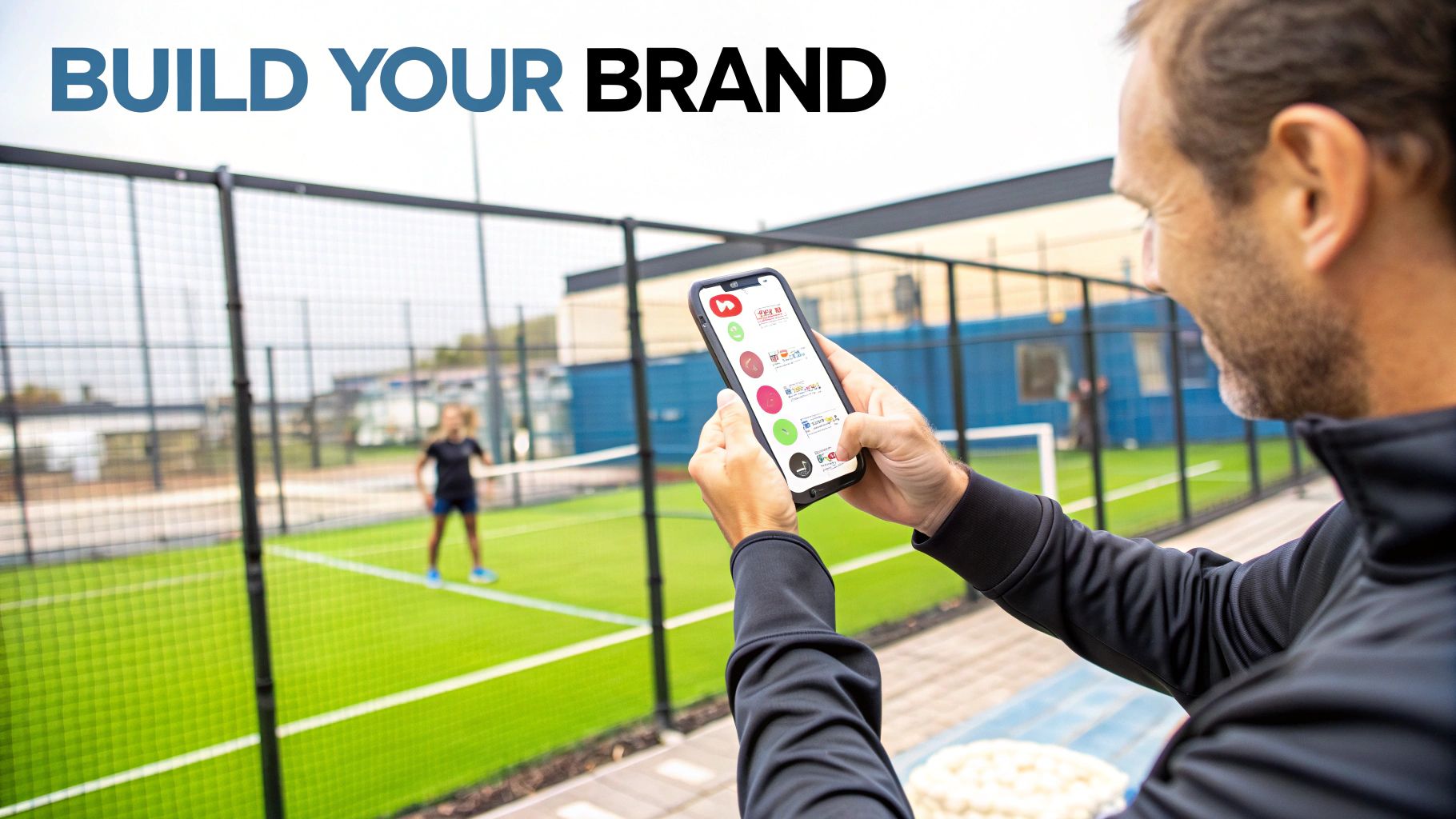
Alright, you’ve got the qualification. Now for the exciting part: turning your passion into your profession. This is the moment you transition from being a skilled player who can teach into a business-savvy coach who understands their own value.
Your first big decision is figuring out how you want to work.
Broadly speaking, you've got two main paths. You can either work for an established club or go it alone as a self-employed coach. Working within a club is the stable route; you’ll get a consistent flow of clients, guaranteed court access, and you won’t have to stress about marketing. The trade-off? Less say over your schedule and how much you can charge.
Going fully independent, on the other hand, gives you complete control. You set the hours, you design the services, and you pocket all the profits. It’s definitely more of a hustle, but the potential rewards are much bigger.
Setting Up as an Independent Coach
If the freedom of the independent route is calling to you, getting organised is your new best friend. It’s time to start thinking like an entrepreneur. Before you even think about booking your first client, you need a game plan. Spending some time creating a solid business plan isn't just corporate jargon; it's the strategic map that will guide your entire venture.
With your plan in place, your next job is to define what you're selling and what it costs. Don’t just fall into the trap of offering one-off hourly lessons. Get creative and put together some attractive packages that encourage players to commit and offer them better value.
Think about offering things like:
- Beginner Bundles: A set of four or five lessons perfect for taking a total novice from holding a racket for the first time to understanding all the basic shots and rules.
- Group Clinics: Themed sessions are great. You could focus on a specific skill, like mastering the bandeja, or run a clinic on smart doubles tactics.
- "Play with a Pro" Sessions: This is a fantastic premium service. Players get to partner with or play against you for some high-level match practice and immediate feedback.
When you're figuring out your rates, have a look at what other coaches in your local area are charging. Don't forget to factor in your experience, qualifications, and the cost of hiring the court. It’s often best to start with a fair, competitive price and then raise it as you build a stellar reputation.
Marketing and Building Your Brand
As a self-employed coach, you are the brand. Your reputation is currency in the padel world, so start building it from day one. Word-of-mouth is incredibly powerful in the tight-knit padel community, but you've got to give it a little nudge to get started.
Get a simple online presence sorted – a basic website or even just a professional-looking social media profile will do. Share useful tips, post short clips from your coaching sessions (with permission, of course!), and celebrate your clients' wins. This is a brilliant way to showcase your expertise and coaching style without being pushy.
Your marketing doesn’t need to be complex. A great tactic is to collaborate with local sports shops. Offer a free taster session to anyone who buys a new racket from them. It puts you directly in front of keen new players.
Finally, get your admin in order. Use a simple app or even a spreadsheet to keep track of your schedule and payments. Staying organised from the get-go will save you a world of headaches down the line. Many coaches also find it helpful to understand the nuts and bolts of the facilities they use. Knowing a bit about what goes into building an indoor padel court, for example, adds to your professional credibility when you're talking to clients or club managers.
Common Questions About Becoming a Padel Coach
As you get closer to actually starting your coaching journey, the practical questions start bubbling up. It's one thing to have the dream, but it's another to figure out the real-world details. Let's dig into some of the most common things aspiring coaches ask about what the job is really like.
What Is a Realistic Earning Potential in the UK?
This is the big one, right? Your income as a padel coach can swing quite a bit depending on your location, how much experience you have, and whether you're working for a club or going it alone.
Here in the UK, a freshly qualified LTA Padel Instructor who's working part-time at a club can expect to start somewhere in the £15-£25 per hour range. It’s a solid starting point.
But as you get more experience under your belt and achieve higher qualifications, like the LTA Padel Coach (Level 3), your rates can jump up significantly. Seasoned, independent coaches in high-demand spots like London or other big cities can comfortably charge £40-£60+ per hour for private lessons. The key to really maximising your income is building a full schedule of both private and group sessions.
A common mistake is just to think in hourly rates. You unlock your true earning potential by creating packages—like beginner courses or advanced tactical clinics. This secures your income in blocks and offers much better value to your players.
Do I Need to Be an Elite Player to Be Effective?
This question comes up all the time, and I can tell you the answer is a firm no. You absolutely do not need to be a pro-level player to become an outstanding coach. Of course, you need solid technique and the ability to demonstrate every shot properly, but your real value comes from something else entirely: your ability to communicate, analyse, and inspire.
Think about some of the greatest coaches in sporting history—many of them were far from star players. Their genius was in their tactical minds and their skill in teaching others.
Your main job as a coach is to:
- Break down complex movements into simple, easy-to-grasp steps for your beginners.
- Spot and fix technical flaws in your players' games.
- Develop strategic thinking and court sense in your students.
An elite player might not even be able to explain why they do something; for them, it's pure instinct. A great coach, on the other hand, has picked that instinct apart and turned it into a lesson anyone can learn. Your ability to teach will always be more important than your personal ranking.
What Are the Biggest Challenges in the First Year?
Your first year as a padel coach is an amazing learning curve, but it's not without its hurdles. The first big challenge is building a consistent client base from nothing. It takes real time and effort to fill your schedule, especially during those off-peak hours when everyone else is at work.
Another thing to prepare for is the physical and mental side of the job. Coaching is an active role, and being on your feet for hours demands real stamina. You’ll also need a deep well of patience and resilience, as you'll be juggling different personalities, abilities, and expectations every single day. And if you're self-employed, just staying organised with bookings, payments, and admin can feel pretty overwhelming at first.
At Padel Rumors, we're here to support you at every stage of your coaching journey. From detailed guides on technique to the latest industry news, we provide the resources you need to succeed. Explore Padel Rumors to stay informed and sharpen your skills.



